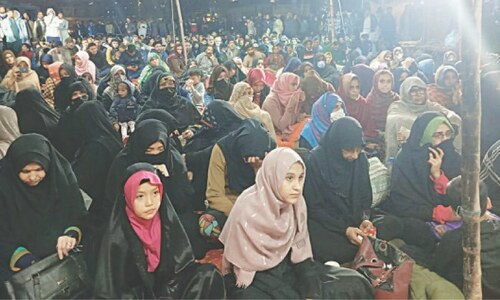KARACHI: Monishka Sharma wakes up at 4am in the morning, performs ablutions, covers her head with scarf and reads her holy book, the Bhagavad Gita. Lastly, she sings prayers and goes back to sleep. When she wakes up later in the day, she doesn’t eat anything till dusk.
“I have been observing a 24-hour fast for the last one month. I have observed 30 fasts during our holy fasting month of Shravan,” the teenage girl tells Dawn.
“I break my fast at sunset with simple food. There is no special one to break the fast. That’s it. With this meal, the fast starts again till the evening the next day,” she explains.
“My mother and father have also observed all the 30 fasts of Shravan,” she adds smilingly.
Like Muslims, Christians and Jews, the Hindus also have a fasting month in their religious calendar.
Shravan or Sawan Maas is the fifth month in the solar calendar followed by the Hindus during which they observe fasts for 30 days every year.
The religious events during the month mark the special event of the birthday of their Supreme Lord Shiva, who, according to the Hindu mythology, creates, protects and transforms the universe.
The religious minority community celebrated the birthday of the Lord Shiva on 19th of this month – the core of the whole month of fasting, praying and seclusion. And this is the month of seeking one’s wishes fulfilled too.
“There had been some problems in my family, so I observed the fasts with a wish to our Lord Shiva to resolve them,” says Sharma.
“I also prayed for Sukh and Shanti (peace and prosperity) as there had been the incidents of killings of our community members over petty issues and kidnappings of the Hindu girls,” she added.
Indirectly, the girl referred to the incidents of forced conversion of the Hindu girls, many of her age, and torture or lynching of the members of her community over the allegations of blasphemy.
Ms Sharma, along with her family, heads to the historic Shri Ratneshwar Mahadev Mandir in Clifton, where special puja was being held to mark the end of the fasting month.
Her third wish is for her future. “I also prayed for my studies,” says the Grade-VIII student,” adding: “I also want to do my own business of computers, so I also prayed for this as well.”
Lord Shiva’s eye on sea disasters
The Hindu community believes that the third eye of the Lord Shiva watches the sea and prevents sea disasters like floods from happening.
It is believed that Lord Shiva used to live in this cave, and also that Guru Nanak used to meditate there, where the Shri Ratneshwar Mahadev temple is made.
Special puja at the end of the month was being held at the temple, which is said to have been built around 300 years ago in a cave, which still exists.
The staircase leads down to the cave and opens up to the Arabian Ocean, which is why this temple has also significance since the prayers at the sea are considered more important.
On the first floor, the special puja was held with a big Hawan (bonfire) in the middle.
Hundreds of worshippers, mostly fasting, attend the puja, where they break their fast as well.
Parsad is considered a sacred edible made from wheat loaf mashed with sugar or gur and asli ghee is distributed at the end.
“This is the first or probably the second largest temple in the metropolis,” young worshipper Ravi Waghela told Dawn, who supervises a live streaming of the puja on Facebook.
During the puja, the temple’s priest Maharaj Ram Nath delivered a sermon highlighting the significance of the month.
“I pray for our people, especially our youngsters, to spend their lives according to the teachings of our religion,” the priest told Dawn, sitting at the corner of the big bonfire.
Also, he pleads the Lord Shiva to control the gushing water, which is causing floods and disasters across the country.
“We offered special prayers to our Lord Shiva, who controls the sea disasters, to help our brothers and sisters affected by the floods in our country,” the priest told Dawn.
In the cave, the worshippers pour milk on the Shivling.
Hours-long puja comes to an end with the distribution of Bhandara (free food) among the worshippers so that they can break their day-long fast.
Sharma and hundreds of other worshippers leave for their homes, content that their Lord Shiva has taken up all their worries and threats of any disasters in the future.
Published in Dawn, August 29th, 2022













































